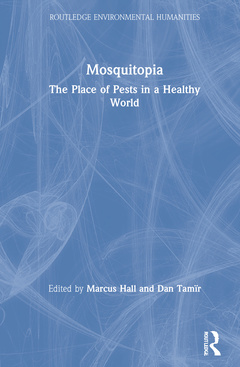Description
Mosquitopia
The Place of Pests in a Healthy World
Routledge Environmental Humanities Series
Coordinators: Hall Marcus, Tamïr Dan
Language: English
Subjects for Mosquitopia:
Keywords
Mosquito; Health science; molecular biology; entomology; animal rights; Pests; Mosquito Species; Mosquito Control; Aedes Aegypti; Aedes Albopictus; Anopheles Gambiae; Indoor Residual Spray; Yellow Fever; Mosquito Vector; Yellow Fever Virus; Dengue Viruses; Asian Tiger Mosquito; Vector Control; Malaria Transmission; Mosquito Populations; Mosquito Habitat; Zika Viruses; Urban Mosquito; Mosquito Eradication; GMEP; CI; Dense; Aedes Aegypti Mosquito; Malaria Control; Insecticide Resistance; Blood Meals
Publication date: 09-2021
· 15.6x23.4 cm · Hardback
Publication date: 09-2021
· 15.6x23.4 cm · Paperback
Description
/li>Contents
/li>Readership
/li>Biography
/li>
This edited volume brings together natural scientists, social scientists and humanists to assess if (or how) we may begin to coexist harmoniously with the mosquito. The mosquito is humanity?s deadliest animal, killing over a million people each year by transmitting malaria, yellow fever, Zika and several other diseases. Yet of the 3,500 species of mosquito on Earth, only a few dozen of them are really dangerous?so that the question arises as to whether humans and their mosquito foe can learn to live peacefully with one another.
Chapters assess polarizing arguments for conserving and preserving mosquitoes, as well as for controlling and killing them, elaborating on possible consequences of both strategies. This book provides informed answers to the dual question: could we eliminate mosquitoes, and should we? Offering insights spanning the technical to the philosophical, this is the ?go to? book for exploring humanity?s many relationships with the mosquito?which becomes a journey to finding better ways to inhabit the natural world.
Mosquitopia will be of interest to anyone wanting to explore dependencies between human health and natural systems, while offering novel perspectives to health planners, medical experts, environmentalists and animal rights advocates.
The Open Access version of this book, available at
http://www.taylorfrancis.com/books/e/9781003056034, has been made available under a Creative Commons Attribution-Non Commercial-No Derivatives 4.0 license
FOREWORD by Clifford Mutero Part 1: COULD WE (SHOULD WE) ELIMINATE MOSQUITOES? 1. Killing Mosquitoes? Think before you swat By Marcus Hall; Dan Tamir 2. The Mosquito: An introduction By Frances M. Hawkes; Richard J. Hopkins 3. Disappearance, Invasion and Resistance: Multispecies ethnography, insect control and loss By Uli Beisel; Carsten Wergin Part 2: LEARNING FROM EXPERIENCE 4. The Long Arc of Mosquito Control By James Webb, Jr. 5. Domesticated Mosquitoes: Colonization and the growth of mosquito habitats in North America By Urmi Engineer Willoughby 6. Could We / Should We Eradicate Mosquitoes? The case of the yellow fever vector By Nancy Leys Stepan 7. Fighting Nuisance on the Northern Fringe: Controlling mosquitoes in Britain between the World Wars By Peter Coates Part 3: KNOW THY ENEMY 8. The Mosquito and Malaria: Would mosquito control alone eliminate the disease? By Willem Takken 9. Living with Mosquitoes in Disease-free Contexts: Attitudes and perceptions of risk in English wetlands By Adriana Ford; Mary Gearey; Tim G. Acott 10. Little one I hold my breath So you can’t find me By Kerry Morrison; Helmut Lemke Part 4: KNOW THYSELF 11. Enacting Politics with Mosquitoes: Beyond eradication and control By Jean Segata 12. Eradication against Ambivalence By Alex Nading 13. The Innocent Mosquito? The Environmental Ethics of Mosquito Eradication By Anna Wienhues Part 5: IMPROVING HUMAN-MOSQUITO RELATIONSHIPS 14. Mosquito Control: Success, failure and expectation in a context of arboviruses expansion and emergence By Isabelle Dusfour; Sarah C. Chaney 15. Designer mosquitoes By Ramya M. Rajagopalan 16. The Mosquitome By Frederic Simard 17. Mosquito Utopias and Dystopias: A concluding dispatch from the front lines By Indra Vythilingam AFTERWORD By Ashwani Kumar
Marcus Hall is an environmental historian and professor at the University of Zurich. In exploring changing human relationships with the natural world, Hall has turned to such subjects as restoring, rewilding, invasive species, warfare, earth art, chronobiology, malaria, and parasites. His books include Earth Repair, Restoration and History, Crossing Mountains, and (with Marco Armiero) Nature and History in Modern Italy.
Dan Tamïr is environmental historian and research associate at the University of Zurich. His research examines the global circulation and the local adaptations of ideologies, species and resources. His current research focuses on the global political cooperation in targeting mosquito-borne diseases during the past century.




